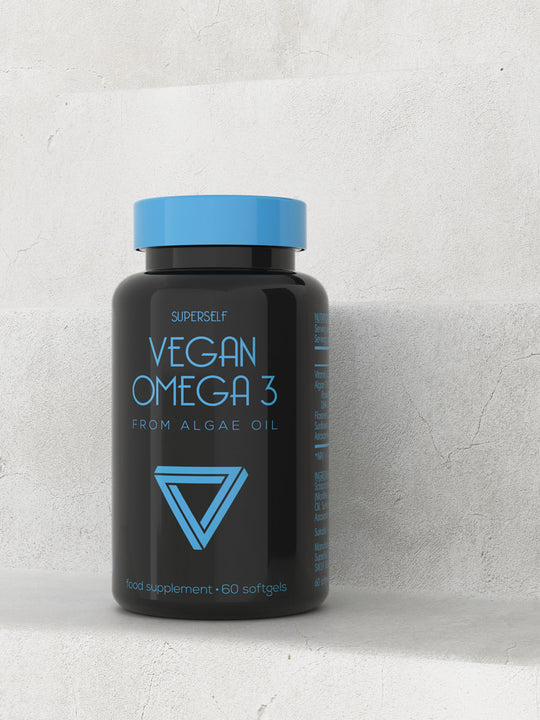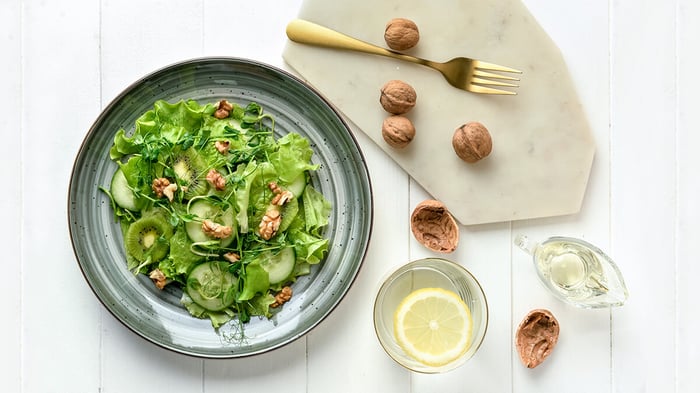Everything you need to know about vegan omega-3, including 7 easy vegan omega-3 sources and great recipes!
Omega-3 is famously found in fish oil, making most supplements and recipes designed to help boost the amount of omega-3 in your diet unsuitable for vegetarians and vegans. However, fish isn’t the only source of this essential nutrient. In this article, we’ll bust some omega-3 myths and help you find the source that’s right for you – and even throw in a few recipe ideas too.
What is omega-3 anyway, and why do I need it?
Is omega-6 Different? Do i need that too?
 Omega-6 is similar to omega-3: it’s also an essential fatty acid. However, as it’s commonly found in nuts, seeds and vegetable oils, such as sunflower oil, soybean oil and corn oil, it’s generally easy to get a daily dose of it by following a typical Western diet.
Omega-6 is similar to omega-3: it’s also an essential fatty acid. However, as it’s commonly found in nuts, seeds and vegetable oils, such as sunflower oil, soybean oil and corn oil, it’s generally easy to get a daily dose of it by following a typical Western diet.
How much omega-3 per day do i need?
The WHO recommends a daily intake of 200–500mg of combined EPA and DHA, and the European Food Safety Authority (EFSA) states that up to 5,000mg per day from supplements is safe. However, it may be necessary to increase or decrease your dosage if you are pregnant, breastfeeding, at risk of heart disease or taking certain medications. Always consult your own medical professional for individual advice.
The 4 key benefits of omega-3
Research is ongoing, so you may see some surprising headlines, such as recent ones discussing the benefits of omega-3 for skin. However, only the following four benefits have reached consensus level and are authorised by the EFSA:
1. ALA contributes to the maintenance of normal blood cholesterol levels
The British Heart Foundation states that “High HDL (“bad”) cholesterol is associated with 1 in 4 heart and circulatory disease deaths in the UK”. Several studies have shown ALA to help maintain normal cholesterol levels.
2. DHA maternal intake contributes to the normal brain development of the foetus and breastfed infants
Nutrition is particularly important during pregnancy and breastfeeding as it can affect the development of the baby as well as the mother’s health. Omega-3 is crucial for brain growth and development in infants. DHA accounts for 40% of the polyunsaturated fatty acids in your brain.
3. DHA maternal intake contributes to the normal development of the eye of the foetus and breastfed infants
DHA, a type of omega-3, is a major structural component of the retina of your eye. DHA deficiency is associated with vision problems such as macular degeneration, which is one of the world’s leading causes of permanent eye damage and blindness.
4. EPA and DHA contribute to the normal function of the heart
Heart attacks and strokes are the world’s leading causes of death, according to the WHO, which means that heart health should be important to everyone. Decades ago, researchers observed that fish-eating communities had unusually low rates of these diseases and eventually linked it to omega-3 consumption. Today, the NHS says, “Omega-3 fatty acids, primarily those found in oily fish, can help maintain a healthy heart and reduce the risk of heart disease when eaten as part of a healthy diet,” adding, “Evidence suggests that vegetarian sources of omega-3 fatty acids may not have the same benefits for reducing the risk of heart disease as those in oily fish.”
Fish oil isn't best for everyone
As well as ethical, religious or lifestyle reasons for wanting to avoid fish oil, there may also be medical reasons to choose a different source of omega-3. Whether taken as a supplement or consumed as part of a dietary choice, omega-3 from oily fish comes with a host of other nutrients which may be beneficial or harmful, depending on your individual needs. For example, the NHS recommends that those at risk of osteoporosis avoid high levels of vitamin A, which is found in high concentration in fish oils. Some oily fish can also contain high levels of mercury. For these, as well as other reasons, vegan omega-3 sources can be a great choice for many people, even if they don’t adopt a vegan diet.
Omega-3 and pregnancy
 As the benefits above make clear, omega-3 is particularly important during pregnancy. However, a problem with using fish or fish oil as the standard source of omega-3 is that it’s often not suitable for use in pregnancy. The NHS recommends eating oily fish regularly as a source of omega-3, but cautions, “Pregnant women are advised to avoid taking supplements containing vitamin A, including fish liver oil supplements, as too much vitamin A can be harmful to an unborn baby”. For this reason, switching to vegan omega-3 supplements that don’t contain additional vitamin A can be a good choice during pregnancy, even for people who are not vegan; although obviously, you should talk to your GP or midwife first.
As the benefits above make clear, omega-3 is particularly important during pregnancy. However, a problem with using fish or fish oil as the standard source of omega-3 is that it’s often not suitable for use in pregnancy. The NHS recommends eating oily fish regularly as a source of omega-3, but cautions, “Pregnant women are advised to avoid taking supplements containing vitamin A, including fish liver oil supplements, as too much vitamin A can be harmful to an unborn baby”. For this reason, switching to vegan omega-3 supplements that don’t contain additional vitamin A can be a good choice during pregnancy, even for people who are not vegan; although obviously, you should talk to your GP or midwife first.
Sources of vegan omega-3
EPA, DHA and ALA tend to come from different sources. EPA and DHA are found in fish oils in high concentrations, while ALA is found in nuts and seeds, including walnuts, flaxseeds and chia seeds. As a result, a vegetarian or vegan diet will typically have a good daily dose of ALA but often close to zero EPA or DHA. While it is possible for the body to convert ALA into EPA and DHA, the process is inefficient, so sources of EPA and DHA are recommended.
Vegan omega-3 sources of ALA include fortified foods such as margarine, spreads, yoghurts, plant milk, juices, smoothies and more. The Vegan Society recommends chia seeds, ground linseed, hemp seeds and walnuts as good, natural sources of ALA omega-3, as well as rapeseed oil (canola oil), a commonly available cooking oil.
Omega-3 in vegan foods

How is algae oil made?
Why are certain fish so rich in EPA and DHA? The answer, it transpires, may be down to something rather lower down the food chain: microalgae. These tiny plants are consumed by a wide variety of sea creatures, resulting in increased concentrations of EPA and DHA further up the food chain. However, it’s also possible to create algae oil omega-3 supplements directly, and these can be good vegan omega-3 sources. Algae oil omega-3 capsules typically provide 400–500mg of combined DHA and EPA per serving.
7 great vegan recipes that are high in omega-3
 Boost your daily intake of vegan omega-3 sources with these gorgeous dishes. From breakfast to dinner, there are options that will suit every lifestyle.
Boost your daily intake of vegan omega-3 sources with these gorgeous dishes. From breakfast to dinner, there are options that will suit every lifestyle.
Crunchy flaxseed crackers from Nourish Every Day
Monique, nutritionist and creator of Nourish Every Day, gives two options for these crackers. The savoury version is perfect for dipping and snacking, so pair it with your favourite hummus or bean dip. The sweeter almond version makes a great stand-alone snack.
Chia seed pudding from Bowl of Goodness
This versatile dish comes from Elina Dunford, a nutritional therapist. Her recipe suggests multiple options, so pick the ones that work for you. We like swapping the honey for maple syrup to create a vegan version. Depending on what you choose to add, it can be a healthy breakfast or a stylish dinner party dessert.
Pear salad with walnuts from Love and Lemons
Simple, delicious ingredients combine to make a flavourful autumn salad and is a great way to use walnuts in a lovely lunch. Skip the optional cheese for a vegan version.
Hemp seed pesto from Nicole Malik
A lifelong vegetarian and the author of the popular vegan cookbook, Weeknight One Pot Vegan Cooking, Nicole adds omega-boosting hemp seeds to a classic pesto recipe. A great one to freeze for easy dinners.
Hemp heart tabbouleh from Eating Bird Food
A superfood salad makes a delicious dinner or a great lunch. Brittany Mullins offers flexitarian suggestions so you can easily make this grain-free, gluten-free fresh salad vegan, vegetarian or with chicken. The hemp seed base is packed with omega-3.
Super seed chocolate protein bites from Oh She Glows
Delicious, healthy treats! These tasty snacks are vegan, nut-free, gluten-free and grain-free. Packed with chia and hemp seeds, these are a great omega-3 boost as well as being full of protein and other great nutrients.
No-sugar raspberry chia jam from Christine Bailey
An award-winning Registered Nutritionist and leading healthy eating expert, Christine provides a great way to turn leftover fruit into a healthy, tasty jam. It’s ideal for breakfast toast or as a sweet yet healthy topping for porridge, puddings and more.
The bottom line
Untangling the nutritional science behind common ingredients and recommended daily doses can be tricky. We hope that this article has given you a clear overview of the benefits that omega-3 can have and inspired you to try adding a new vegan omega-3 source to your diet, whether that’s as simple as snacking on a handful of walnuts or a more elaborate salad or pudding.
Vegan Omega 3 Algae Oil - 60 Softgels

£14.90
Entirely plant-based, vegan omega-3 softgels packed with algae oil DHA. These easy to swallow softgel capsules are designed to be flavourless and burp-free. 500mg of algae oil per serving 250mg DHA omega 3, plus Astaxanthin, Flaxseed Oil & Vitamin E No flavour or… Read More
Find more SuperSelf reviews here.


